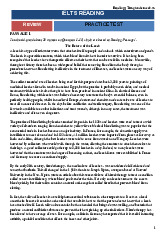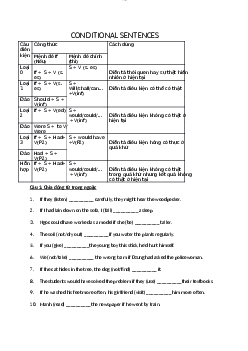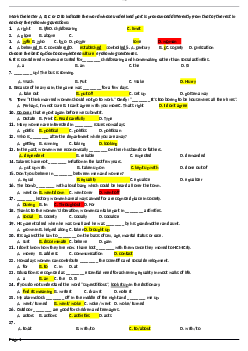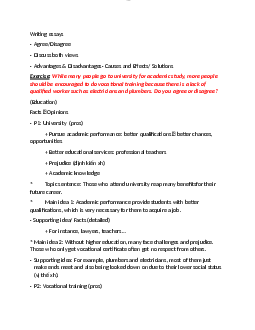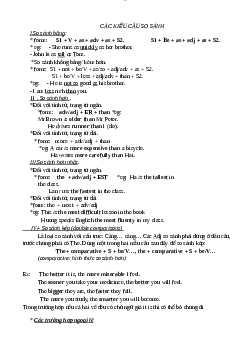




Preview text:
SAMPLE TEST A2.2
Mark the letter A, B, C, or D on your answer sheet to indicate the correct answer to each of the following questions.
Question 1: The documents ______ to the government agency when the secretary finishes copying them.
Câu bị động:
Subject + be + V3/ed + (by + doer) + (…).
A. will have submitted B. will be submitted C. have submitted D. will submit
Question 2: The teacher ______ the students to do the assignment efficiently.
Instruct sb to do sth: hướng dẫn ai đó làm gì.
A. instructions B. instructive C. instructed D. instructor
Question 3: The mother ______ her son’s temperature to see if he had a fever.
Take one’s temperture: Đo nhiệt độ cho ai đó.
A. took B. did C. made D. ran
Question 4: I believe they are about to ______ a law that bans people from public places if they're smoking.
A. cut out ngưng hoạt động, cắt bỏ B. set in bắt đầu C. bring in ban hành D.
turn on khởi động
Question 5: When I entered the room, my daughter ______ the Internet.
S + was/ were + V_ing + when + S + Ved/bqt
A. has surfed B. was surfing C. is surfing D. surfed
Question 6: The company ______ by a larger corporation, is now a subsidiary. Bị động
A. acquired B. was acquired C. acquiring D. acquires
Question 7: My son is excited ______ going to the zoo with his classmates.
Be excited about sth: hào hứng với cái gì
A. on B. of C. in D. about
Question 8. Those ................outlook on life is positive are always happy.
A. who B. which C. when D. whose
Question 9: Investigators usually assess the crime ______, collect evidence, prepare reports and testify in court.
A. vision B. sight C. view D. scene
Question 10. Despite having a high temperature, Kate.............. at the meeting.
Despite + N/V-ing, qkd
A. came across băng qua B. called round ghé thăm C. turned up xuất hiện D. got round cuối cùng đã ht
11. A part-time job gives me the freedom to _______ my own interests.
Pursue my own interests chạy theo đam mê A. pursue B. seek C. chase D. run after Question 12: I will contact you ______.
- Tương lai đơn + until / when / as soon as + Hiện tại đơn
- Tương lai hoàn thành + by / by the time + Hiện tại đơn
2. 2. Khi mệnh đề trạng ngữ chỉ thời gian ở thì hiện tại hoàn thành;
- Tương lai đơn + after + Hiện tại hoàn thành
2.3. Khi mệnh đề trạng ngữ chỉ thời gian ở thì quá khứ đơn.
- Quá khứ đơn + when/ until/ before/ after/ as soon as + Quá khứ đơn
- Quá khứ tiếp diễn + when + Quá khứ đơn
- Hiện tại hoàn thành + since + Quá khứ đơn
- Quá khứ hoàn thành + by the time/ before + Quá khứ đơn2.4. Khi mệnh đề trạng ngữ chỉ thời gian ở thì quá khứ tiếp diễn.
- Quá khứ tiếp diễn + while + Quá khứ tiếp diễn
- as soon as I get the information about the course
- as soon as I was getting the information about the course
- as soon as I had got the information about the course
- as soon as I got the information about the course
13. She passed the exam with excellent results and was_________ a scholarship.
A. rewarded B. presented C. gave D. granted
Question 14: ______ European Union has implemented new policies to address climate change.
A. The the + tên tổ chức B. (no article) ∅ C. An D. A
15. We should impose restrictions _________ media advertising of alcohol
A. in B. with C. from D. on
Question 16: Jennie is inviting Jason to join her volunteer group this summer.
- Jennie: “Would you like to join our volunteer group this summer, Jason?” - Jason: “______”
A. Yes, I’d love to. B. Sorry I am busy now.
C. Well done. D. Me neither.
17. I am looking forward to ________ on vacation
A. go B. be going C. going D. having gone
Question 18: Ted and Kate are talking about the school curriculum.
- Ted: "Swimming should be made part of the school curriculum."
- Kate: “______. It is an essential life skill.”
A. I couldn't agree with you more B. You can make it
C. Oh, that's a problem D. Not at all
19. I was just about to ring up his office_______ he arrived home.
A. when khi B. although mặc dù C. then sau đó D. as vì
20. Even though he was bored _______ doing the same thing every day, he was nervous ______ making a change.
A. about/ at B. with/ for C. in/ about D. with/ about
21. While Peter was driving home last night, he __________ petrol. When/While + qktd, qkd : Đang làm gì thì có gì xen vào.
A. was running out B. was running out of C. ran out of D. ran out 22. She wondered_______ her father looked like now, after so many years away. Wonder what someone look like : ko biết ai đó nhìn như nào
A. how B. whose C. what D. that
23. A woman had a narrow escape when the car came round the corner.
A. was hurt B. was nearly hurt C. ran away D. bumped into the car
24. Smoking has been banned in public places in some countries.
A. made illegal B. limited C. restricted D. given way
25. I think we have solved this problem once and for all.
A. in the end B. forever C. temporarily D. for everybody
26. I ............. Katie, an old friend on the way home from the office yesterday.
A. came into B. broke into C. ran into D. went into
27. I will never forget.............. with Janet, who keeps................ all the time.
A. working / to try B. to work /to try C. working / trying D. to work / trying
28. I ............... grateful if you could tell me what duties are involved in this job.
A. was B. were to be C. would be D. am
29. I am looking for a friendly young person to help......... my elderly mother while I go out to work during the day.
A. take after B. give care of C. put up with chịu đựng D. look after
30. I ................... three rooms of the house so far today; I'll do the other two this afternoon.
A. has been cleaning B. Cleaned C. are cleaning D. have cleaned
31. If I had my credit card with me, I ............. the coat.
A. would have bought B. will buy C. would buy D. have to buy
Mark the letter A, B, C, or D on your answer sheet to indicate the word(s) CLOSEST in meaning to the underlined word(s) in each of the following questions.
Question 32: It was really difficult for him to determine whether to take part in the race or not.
A. believe B. decide C. examine D. think
Question 33: The state government is determined to tackle the problem of poverty in the inner cities.
A. solve B. pose C. encounter D. cause
Mark the letter A, B, C, or D on your answer sheet to indicate the word(s) OPPOSITE in meaning to the underlined word(s) in each of the following questions.
Question 34: Some of the passengers looked green around the gills after the trip! Their faces turned pale.
A. felt a sharp pain in their feet B. became very exhausted
C. were in need of sleep D. had a lot of energy
Question 35: Skills can be enhanced by the appropriate use of technology in certain circumstances.
- irregular B. regular C. extensive D. unsuitable
Mark the letter A, B, C, or D on your answer sheet to indicate the sentence that is closest in meaning to each of the following questions.
Question 36: "What time did the bus arrive, Tom?" asked John. A. John asked Tom what time the bus arrived.
- John asked Tom what time was the bus arriving.
- John asked Tom what time the bus had arrived.
- John asked Tom what time had the bus arrived.
Question 37: I last went to the cinema six months ago. S+last+V qkd+O+time+ago= S+V htht + O+ for/since + time
- I didn’t go to the cinema for six months.
- I haven’t gone to the cinema for six months.
- I have gone to the cinema for six months.
- I went to the cinema for six months.
Question 38: It is not necessary for you to wear formal clothes to the party this evening. A. You shouldn’t wear formal clothes to the party this evening.
- You would wear formal clothes to the party this evening.
- You must wear formal clothes to the party this evening.
- You needn’t wear formal clothes to the party this evening.
Mark the letter A, B, C, or D on your answer sheet to indicate the sentence that best combines each pair of sentences in the following questions.
Question 39: Wearing face masks is compulsory at public places. It is a must-do for everyone. A. By no means is it obligatory for everyone to wear face masks at public places.
- On no occasion is it obligatory for everyone to wear face masks at public places.
- Under no circumstances is it allowed to stop wearing face masks at public places, as it is obligatory for everyone.
- On no account was it allowed to stop wearing face masks at public places, as it is obligatory for everyone.
Question 40: They don’t have enough money. They can’t buy a new car. A. If they had had enough money, they could have bought a new car.
- If they had enough money, they could buy a new car.
- Provided they have a lot of money, they can’t buy a new car.
- If they had enough money, they couldn’t buy a new car.
Read the following and mark the letter A, B, C, or D on your answer sheet to indicate the correct answer to each of the questions from 39 to 43.
Lifelong learning is now becoming a must for everyone in the modern world. Many people, however, find it overwhelming, as being lifelong learners means they will have to keep studying for their entire life. The following are several strategies to promote lifelong learning.
First, start with a clear purpose. Study something that you will likely have many uses in the future. Design learning goals that should serve you in your career path, as well as in your personal interests. You will need to think of the learning experience as continuous investment rather than a one-off endeavor.
Second, choose something that is really enjoyable for you. You will need to have fun all through the pursuit of knowledge and skills, which will be an endless journey. The ‘fun' part will always keep you motivated, even during the hard times. Third, lifelong learning is not just about keeping on studying; you will need to think through what you have learned, and find out how to apply it in your work and personal life. Don't read too much and use your brain too little. Think more often; meditate on the ideas that you feel might make your work and/or life better.
Those are the key strategies to make sure your lifelong learning is studying smart rather than studying hard. Remember, the lifelong learning movement is unstoppable.
Question 41: What is the passage mainly about?
A. Strategies to promote lifelong learning B. How to choose something to study C. How to keep on studying all the time D. Education – the preparation for life Question 42: The word “it” in paragraph 1 refers to ______.
A. clear purpose B. entire life C. modern world D. lifelong learning
Question 43: According to paragraph 2, to become a smart lifelong learner, you should ______.
A. define a specific objective B. avoid designing a learning goal
C. study anything you like D. neglect the learning experience
Question 44: The word “motivated” in paragraph 3 is CLOSEST in meaning to ______.
A. discouraged B. inspired C. scared D. amused
Question 45: Which of the following is NOT true about strategies for lifelong learning?
- We should motivate ourselves to learn effectively
- We should choose something that we have an interest in
- We should use our brain in a lot of reading
- We should apply our knowledge in work and life
Read the following and mark the letter A, B, C, or D on your answer sheet to indicate the correct answer to each of the questions from 44 to 50.
People who daydream are often thought of in negative terms, such as being lazy or not doing what they should be doing. However, scientists who study the brain have learned many interesting things, especially from studying the brains of daydreamers. In fact, far from being a waste of time, some scientists believe that daydreaming is a healthy and useful activity for all of our brains.
In order to study the brain, scientists use special devices that scan the brain and show pictures of which parts of the brain are active at certain times. When a person is daydreaming, the device will show a distinct pattern of activity in the brain called the “default” mode of thinking. In the default mode, the top or outside part of the brain is very active. Actually, several regions of the brain are interacting in this mode. Some scientists describe this mode as a time when the brain focuses on itself rather than focusing on the environment around the person. Typically, this occurs when a person is doing simple, tedious work or performing routine actions that don’t need much attention, like walking to school or cooking simple foods.
People tend to daydream during such activities.
The importance of daydreaming lies in developing both creative and social skills. When the mind is not engaged in dealing with one’s immediate situation or problem, then it is free to wander. A time of wandering allows the mind to create things. New inventions may be imagined, or possible solutions to a problem can be planned. For example, solutions for problems in relationships with other people may come to mind. In fact, most daydreams involve situations with others. Perhaps these are daydreams based on memories of the past, or daydreams of what might be in the future. In either case, daydreams help us develop the appropriate skills we can use in real interactions with others.
As a neurologist, Dr. Marcus Raichle of Washington University explains: “When you don’t use a muscle, that muscle really isn’t doing much. But when your brain is supposedly doing nothing and daydreaming, it’s really doing a tremendous amount.” During the so-called “resting state” the brain isn’t resting at all!
(Adapted from Reading Challenge 3, Second edition, by Casey Malarcher & Anderea Janzen)
Question 46: Which of the following is the best title of the passage?
- How to Avoid Daydreaming and Stay Focused
- Negative Effects of Daydreaming on the Brain
- Daydreaming: A Waste of Time or a Useful Activity?
- The Benefits of Daydreaming on Brain Development
Question 47: The word distinct in paragraph 2 is closest in meaning to ______.
A. stable B. changing C. complex D. particular
Question 48: In order to research the brain, the scientists ______.
A. employ unique scanning instruments B. observe people while they sleep C. scan the “default” mode of thinking D. create a distinct pattern of its activity Question 49: The word it in paragraph 3 refers to ______.
A. daydreaming B. the mind C. the problem D. situation
Question 50: The word tremendous in paragraph 4 is closest in meaning to ______.
A. adequate B. enormous C. limited D. deficient
Read the text and choose the correct answer for each gap.
Education is more important today than ever before. It helps people acquire the skills they need for such everyday(51)__________ as reading a newspaper or managing their money. Its also gives them the specialized training they may need to (52) __________ for a job or career. For example, a person must meet certain educational requirements and obtain a (53) __________ or certificate before he can practise law or medicine. Many fields, such as computer operation or police work, (54) __________ satisfactory completion of special training courses.
Education is also important (55) __________ it helps people get more out of life. It increases their knowledge and understanding of the world. It helps them acquire the skills that make life more interesting and enjoyable, (56) __________ the skills needed to participate in a sport, paint a picture, or play a musical (57) __________ . Such education becomes (58) __________ important as people gain more and more leisure time.
Education also helps people adjust to change. This habit has become necessary because social changes today take place with increasing speed and (59) __________ the lives of more and more people. Education can help a person understand these changes and (60) __________ him with the skills for adjusting to them.
- A. activities B. works C. jobs D. actions
- A. do B. prepare C. make D. work
- A. lisence B. ard C. diploma D. paper
54.A. requires B. requiring C. to require D. require
- A. there fore B. d espite C. although D. because
- A. such as B. for instance C. such that D. for example
- A. appliance B. equipment C. instrument D. device
- A. increased B. increasing C. increase D. increasingly
- A. effect B. affect C. affective D. effective
60.A. with B. for C. in D. to
